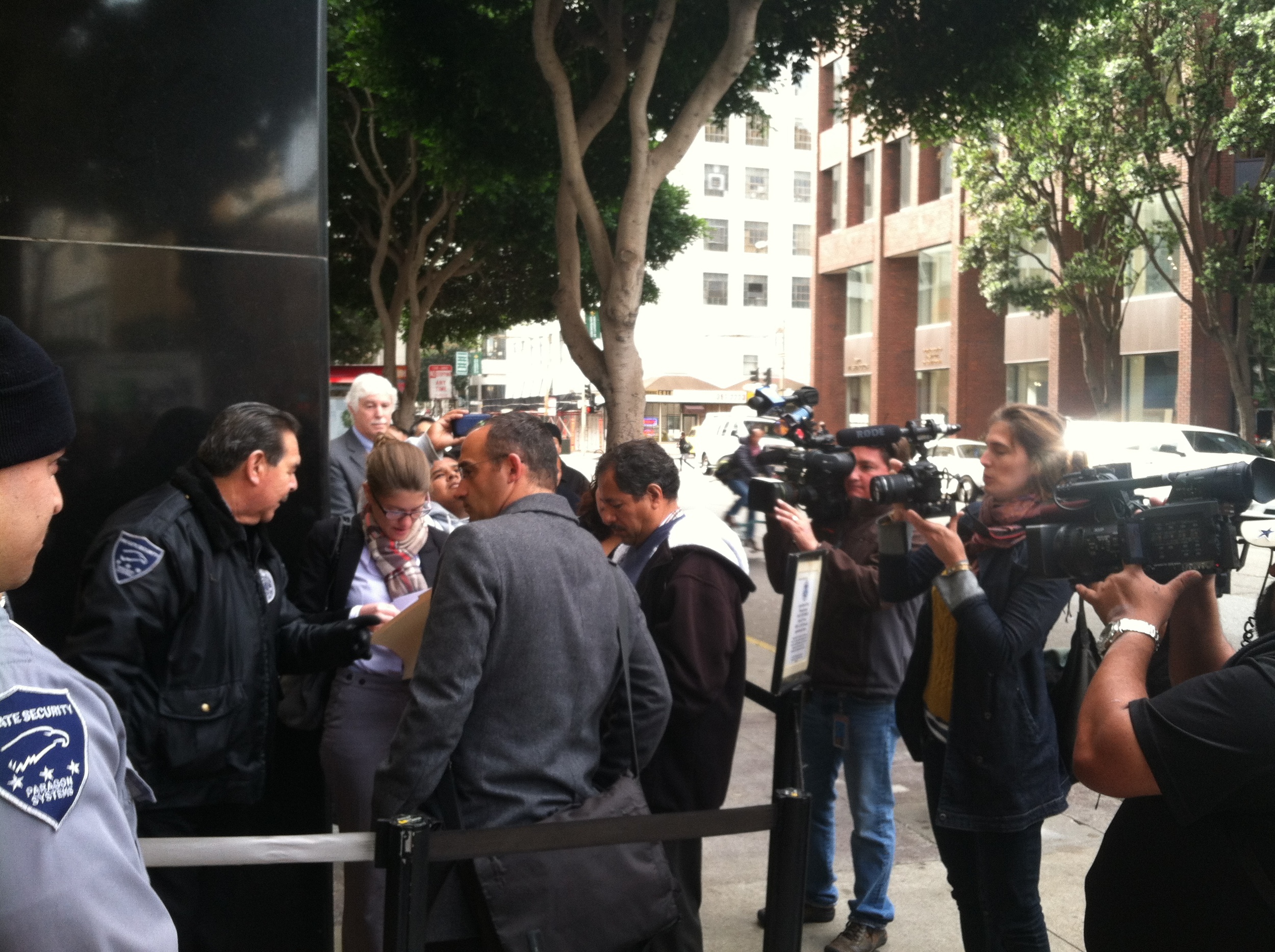Full text of Petition:
Call for Integrity, Protection and Care for Asylum Seekers Undergoing Credible Fear Interviews in the United States
We, a broad and diverse coalition of immigrants and advocates for immigrant, LGBTQ, and human rights, request an immediate rescission of the 2014 Lesson Plan on Credible Fear of Persecution and Torture Determinations (2014 Lesson Plan) issued by the U.S. Citizenship and Immigration Services (USCIS) on February 28, 2014.
Background: The purpose of a credible fear determination is to screen for possible refugees and to ensure that the U.S. does not return a person to a country where the person would be at risk of being persecuted or tortured. We are concerned that the 2014 Lesson Plan and resulting training of asylum officers will lead to violations of U.S. obligations under domestic and international laws to protect asylum seekers.
USCIS formulated the 2014 Lesson Plan at a time when immigration reform has stalled in Congress and the number of individuals seeking protection in the U.S. has increased. The Chief of the Asylum Division, John Lafferty of the Department of Homeland Security (“DHS”), stated in his memo explaining the background of the 2014 Lesson Plan that its issuance is in light of the increased use of resources devoted to an increased number of credible fear adjudications. In addition, the Asylum Office stated that the 2014 Lesson Plan was designed to reduce the number of asylum seekers “clogging up the court” system. We are concerned that the 2014 Lesson Plan aims to reduce the number asylum seekers in the U.S., rather than comply with our values and statutory obligations requiring that the U.S. protect potential refugees and individuals facing torture.
Individuals who previously would have received positive determinations have, under the 2014 Lesson Plan and training, received negative determinations including most vulnerable asylum seekers, including LGBTQ victims and survivors of domestic violence.
Time will reveal the full impact of the lesson plan, but there is early cause for concern. One organization that represented and co-counseled on a group of ~70 credible fear interviews from mid-March to early-April 2014 experienced a significantly higher rate of negative decisions than the rate that was typical in FY 2013. The Asylum Office’s explanation for the sharp increase in these negative determinations was that these asylum seekers were considered under the new 2014 Lesson Plan. None of the claims were denied based on credibility. The interviews were over the telephone, while the asylum seeker was detained, and the screening lasted 2-3 hours. The asylum seekers were essentially required to present their full asylum case during their screening, as is required under the new standards, but without the measures and resources needed for determinations to be accurate.
Just looking at this sample of 70 cases, the impact of the 2014 Lesson Plan is very troubling. It has had the effect of screening out meritorious claims of individuals including LGBTQ individuals, domestic violence survivors, and other vulnerable groups. Asylum is a complex and frequently evolving area of law, especially the category of “particular social group,” for which asylum seekers such as LGBTQ individuals and survivors of domestic violence may qualify if given an opportunity to present their claim with appropriate conditions and resources. However, based on the snapshot we have seen, the 2014 Lesson Plan risks leading to an increase in erroneous determinations that will prevent the most vulnerable asylum seekers from ever having an opportunity for safety and protection.
The 2014 Lesson Plan is misleading because its organization, formulation, and tone suggest a higher standard for making a positive credible fear determination than appropriate under applicable law.
When people present themselves at a port of entry in the United States and expresses a fear of returning, the law requires that the individual receives a credible fear determination from the asylum office. The standard of proof for a credible fear is a “significant possibility” that the person can establish eligibility for asylum. The significant possibility standard is meant to set “a low threshold of proof of potential entitlement for asylum” and serve as a “net that will capture all potential refugees and individuals who would be subject to torture if returned to their country or feared persecution or harm.”
In his detailed memorandum, Immigration Law Professor, Bill Hing, lays out some of the key problems with the 2014 Lesson Plan. According to Professor Hing, the 2014 Lesson Plan is riddled with a tone that conveys a higher burden of proof for the asylum applicant than the appropriate standard for credible fear. The law, as interpreted by the Supreme Court, provides that “a 10% chance of persecution may be sufficient to establish a well-founded fear” for asylum. Credible fear is merely a screening process to determine possible eligibility for asylum or that a 1 in 10 chance of persecution is likely. This standard carries an important humanitarian purpose given what is at stake in making a mistake. One problem with the 2014 Lesson Plan is that it instructs officers to require that an asylum seeker “produce sufficiently convincing evidence that establishes the facts of the case.” This misleadingly insinuates that at the screening phase, an asylum seeker has the burden of providing evidence to support the asylum claim. It further states, “While a mere possibility of success is insufficient to meet the credible fear standard, the ‘significant possibility’ standard does not require the applicant to demonstrate that the chances of success are more likely than not.” This is one of many examples in which the 2014 Lesson Plan misleadingly insinuates that a slightly less than 50% possibility of success is required.
Thus, the Lesson Plan risks great confusion that a high possibility of success is required, which is inappropriate under the Supreme Court precedent.
With the 2014 Lesson Plan, DHS greatly risks erroneously returning many asylum seekers in violation of basic principles of refugee law.
The way to address the influx of people seeking protection—that is both humane and ethical and in compliance with domestic and international law—is to set up safety systems, agencies, and programs to absorb the need. The 2014 Lesson Plan, however, could have the effect of returning tens of thousands of traumatized victims of violence, who often take great risks and face dangerous journeys to seek safety in the U.S.
One of the basic principles of refugee law, non-refoulement, refers to the obligation of States not to refoule, or return, a refugee to “the frontiers of territories where his life or freedom would be threatened on account of his race, religion, nationality, membership of a particular social group or political opinion.” Non-refoulement is universally acknowledged as a human right, including by the United States, as codified by Congress in the Refugee Act of 1980. In the United States, the principle of non-refoulement prohibits the removal of potential refugees and individuals fleeing torture, and it attaches before a determination is made in a case.
By improperly raising the bar for credible fear, DHS risks eliminating a crucial safety net and returning many asylum seekers erroneously, in direct violation of international law and statute, the 1951 Convention and its 1967 Protocol, and the principle of non-refoulement as implemented through the 1980 Refugee Act.
Call for integrity, protection, and care for asylum seekers in the United States.
We call for a basic level of integrity, protection, and care for asylum seekers undergoing credible fear interviews in the United States. We urge USCIS to rescind the 2014 Lesson Plan and retrain officers to apply an appropriate standard that upholds our values and laws.
###
Thank for your support - please consider signing the petition here.
Niloufar Khonsari
Pangea Legal Services







